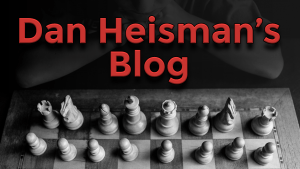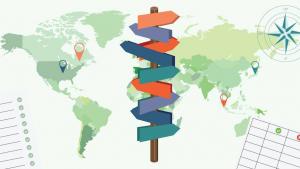Q&A with Coach Heisman Apr 12, 2013
Chess is a game of knowledge and skill. Yet many players - as evidenced from the majority of questions I get on the show - seem to think improvement initiatives lean toward the knowledge side, typical questions being "Where can I learn more about planning?" or "What variation against the French should my beginner friend play?" While it is true that knowledge is very helpful and there is a correlation between playing strength and chess knowledge, it is more likely the skill part that constitutes most of your playing strength.
I think two reasons many players turn toward knowledge is:
- New chess knowledge is much easier to "find" than skill improvement information, and
- they think that acquiring/enhancing skill is either not possible or difficult. I addressed this issue in some length in my blog Chess Skills are not Have and Have Not
I feel a little sorry when someone is searching for a new opening to play if their purpose is to "discover" the right opening for them, as if this will unlock a whole new level of improvement. It doesn't happen that way (or at least rarely). I noticed when I got to 1900 USCF after two years of tournament play that many players with lower ratings than I had more extensive knowledge, but my analysis skill was what propelled me above them on the rating list (so, yes, it is possible for a 1600 to know more about chess than a 1900). I had been rated 2100 for couple of years by the time I lost a "book" Philidor rook and pawn endgame draw (to wise old master E. Schuyler Jackson); the moral of the story was not that if I had more knowledge I would not have lost (true), but that I was in the upper 1-2% of all tournament players without such "basic" knowledge. It just wasn't as necessary as some would have you believe.
In a similar vein I get a lot of questions indicating that taking action to maximize current performance (or mask weaknesses) is the way to go. If you are playing one important game or event, then masking weaknesses is certainly helpful. However, if you are not playing a really important event and your goal is long-term improvement, then exposing and working on your weaknesses may prove more beneficial in the long run. On the show I made the analogy that your chess strength is sometimes like a chain; you are only as strong as your weakest "link". I also addressed this subject in my Chess.com blog Improving Vs. Maximizing Performance, which I used as a base for a more extensive Novice Nook on the same subject.
Speaking of Novice Nooks, someone asked if back "issues" of the column would be available on my website free since Chess Cafe is now (starting with columns as of Jan 2013) selling the newly archived ones for 99 cents. In other words, if you want to read a column like My Top Tips for Chess Improvement from Feb 2012 that will always be free (take the link!) but, if you want to read the Feb 2013 column, Position Dependent Ideas, that link takes you to the Chess Cafe store where it offers you the column for 99 cents (not to be confused with the Cafe Press store where Chess.com's Dan Heisman Learning Center sells our wares and the net proceeds go to my chess charity).
The answer is that I can't offer these columns for free. Chess Cafe pays me for these and owns the rights. Obviously, they would not be willing to compensate me if I competed with them with a free version; doing so would be illogical and bad business. So, while I sympathize that post-Jan 2013 archives are no longer free, I did point out that each month's column (as well as all 12+ years of pre-2013 columns) were still free. Therefore, if you are a regular reader you get the current one free, and can print it out and save it if you wish (Off topic: I also have had a "Chess Tip of the Day" the past four years on Twitter @danheisman).
Also on the subject of Novice Nook, I pointed out that it was not a coincidence that many generic questions on the Q&A show are often covered in some depth by an archived column (I often give these questions a brief "overview" answer and then post on the channel the URL of the more extensive answer). Since these are the same questions I get asked the most over the years, it makes sense that if there is a generic answer worthy of a column, that these would be the most instructive, or at least the most interesting columns, to write  .
.
Someone asked the important question as to what Chess.com is doing about better supporting slow chess. Currently the fastest US Chess Federation time limit allowed for slow ratings (30 0) is the slowest time limit "offered" by Chess.com when you log on Chess Live. It is important to note that if you and a friend wish to play at a slower time limit, any limit (within reason) is available. IM Daniel Rensch has informed me (and some of the managers at the Dan Heisman Learning Center) that Chess.com is well aware of this limitation and is taking proactive steps to upgrade the slow chess capabilities of Chess.com in more than one area. I have not pressed him for details (they still may be debating exactly what and how to do this) and I don't have much more information than this to offer. However, I get the distinct feeling this is not a "back-burner" issue and that over the next year or two we will be seeing some major Chess.com initiatives in this area.
There was a question about triangulation and the viewer gave me a non-trivial example (at that point the Live Chess analysis board seemed stuck so I could not attempt it "live"), but here's an easier one (click on the moves to see the light notes):
Other external links mentioned in today's show:
- Getting the Edge (include pros of playing speed chess)
- Break Moves
- Chess Books and Prerequisites (question about How To Reassess Your Chess) - note: This was my first Novice Nook that achieved wide recognition
 .
. - Don't Know What to Do? Try Dan's Dirty Dozen
- The Most Common and Important Use of Tactics
- Chess, Learning, and Fun
- (My) Beginner Misconceptions
- Making Chess Simple
- The Most Common Opening Inaccuracies - regarding 1.d4 d5 2.c4 Nf6 3.cxd5 Nxd5 4.Nf3 (easier to play than the common 4.e4, with the idea of 5.e4)
- Learning Opening Lines and Ideas
- Steinitz' Theory
- Book: The World's Most Instructive Amateur Game Book (now in Forward Chess format)
- Book: Back to Basics: Tactics (now in e+chess format)
- App: Forward Chess
- App: e+chess
Next show Apr 26 will just be for Diamond and Platinum members.






